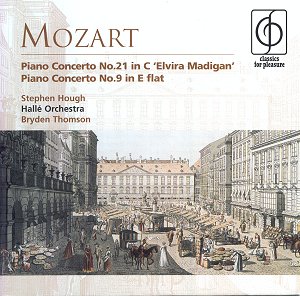By virtue of its slow movement, the k467 Concerto
in C major has become one of the most recorded of Mozart’s concertos
ever since the film "Elvira Madigan" of 1967. It is a relatively
mature work, whereas its partner here, k271, was written when
Mozart was only twenty but is probably one of the most performed of
the less mature concertos.
Many great pianists from Schnabel onwards have recorded
k467 so competition is stiff. What we have here is a budget coupling
from EMI which is reissuing these performances recorded in the Free
Trade Hall Manchester in 1987. Stephen Hough has carved for himself
a little niche in the market with the light concertos of Hummel, the
recordings of which have been much admired; likewise with the Mendelssohn
concertos. The Mozart concertos are, of course, in a different league.
The works have a depth to them, an intensity of feeling
that is not just confined to their great slow movements. The Hallé/Hough
partnership does not respond too convincingly to this aspect of the
music. The delicate fleetness of Hough's playing that works so well
in Hummel gave much pleasure to me but I felt more was required. Those
who buy this disc for the "Elvira" slow movement of k467
may well be disappointed. The performance here would not perhaps provide
the best case to back the implication in Peter Schaffer's play 'Amadeus'
that Mozart was a conduit through which heavenly thoughts were delivered
to humankind from above. However, there are good things. The Hallé
provides a full orchestral sound that, under the sure direction of Bryden
Thomson (also Hough’s partner in his Hummel recording), invests a sweep
into the performance of k467 that helps to confirm the work as
one of the most symphonic of the piano concertos. And Hough’s playing
is always secure with many subtleties of touch that can delight. I kept
feeling that his style would suit a fortepiano rendering accompanied
by "original" instruments.
At the first appearance of this recording in 1988,
Decca were marketing a rival budget disc of k467 (coupled with
k414) with Radu Lupu in a performance from the 1970s. No longer
available in that form, the well thought of performance of k467
is now incorporated into a bargain "Double Decca" Mozart miscellany.
If good value is an issue then it is worth considering. However, there
is much to recommend the Hough disc and the lesser known k271
is worth having, not least for its remarkable, expansive slow movement.
John Leeman


